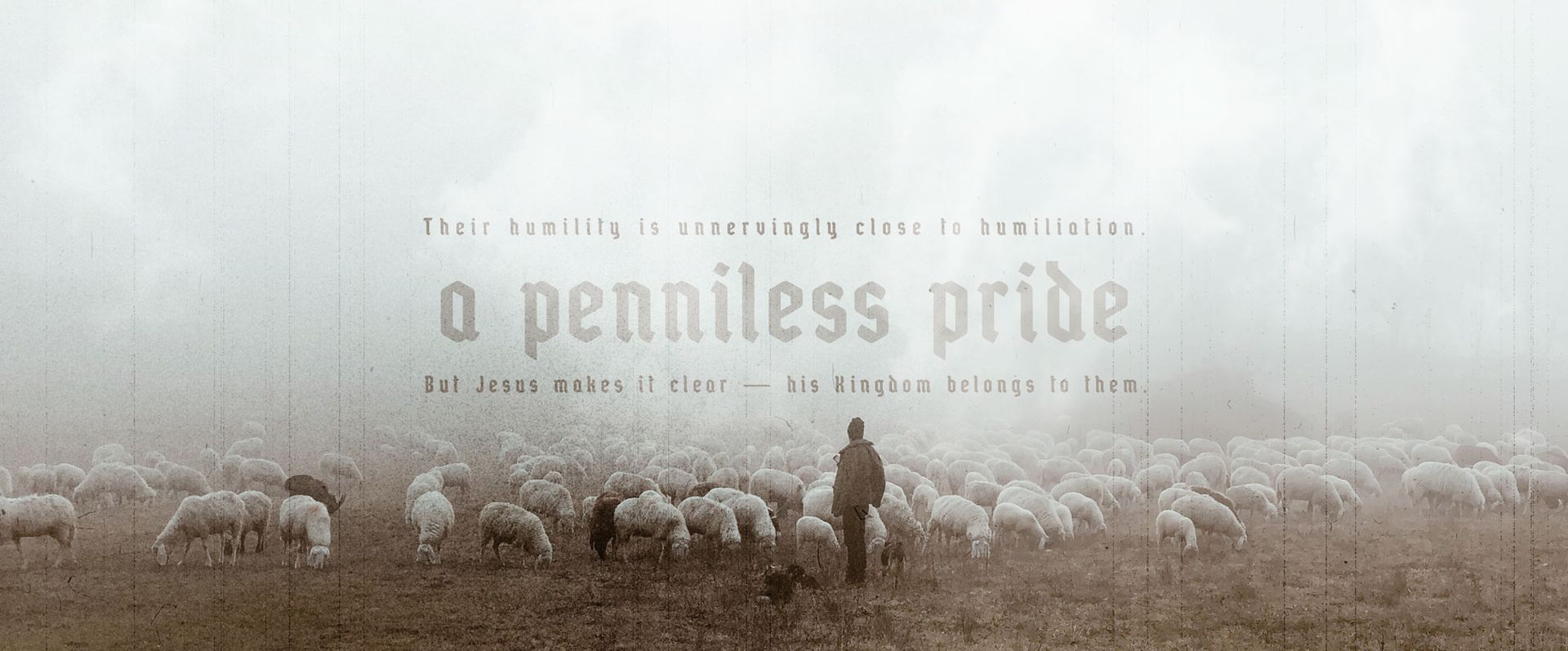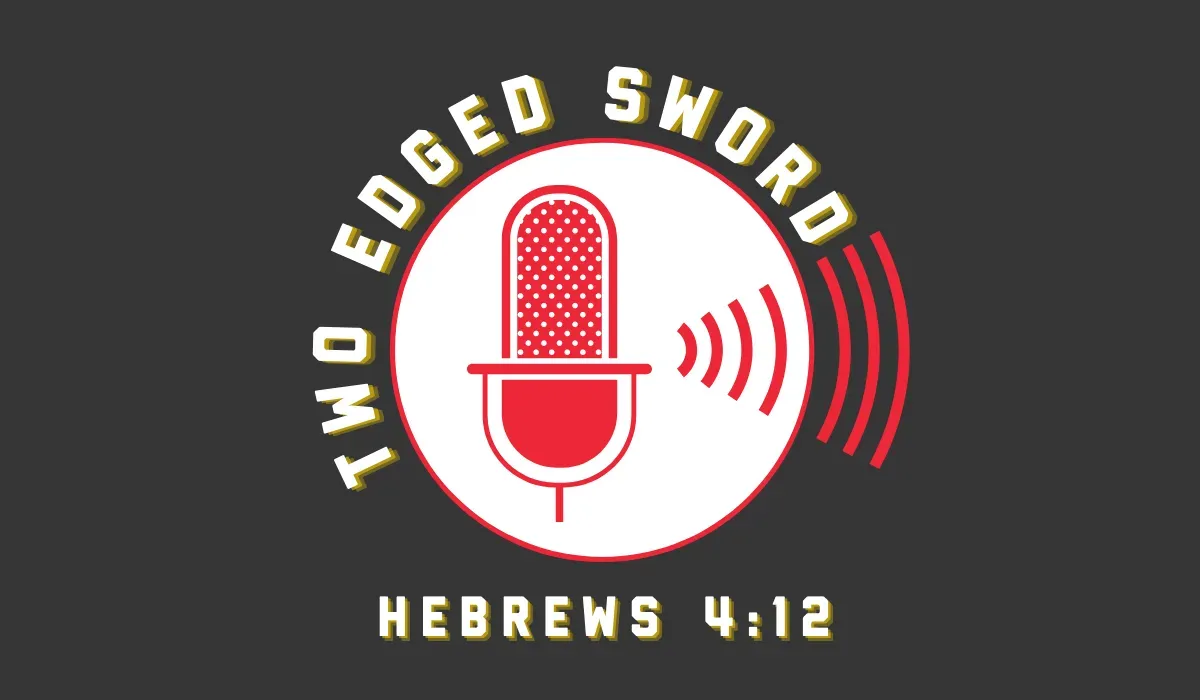DAVID PARKS BLOG
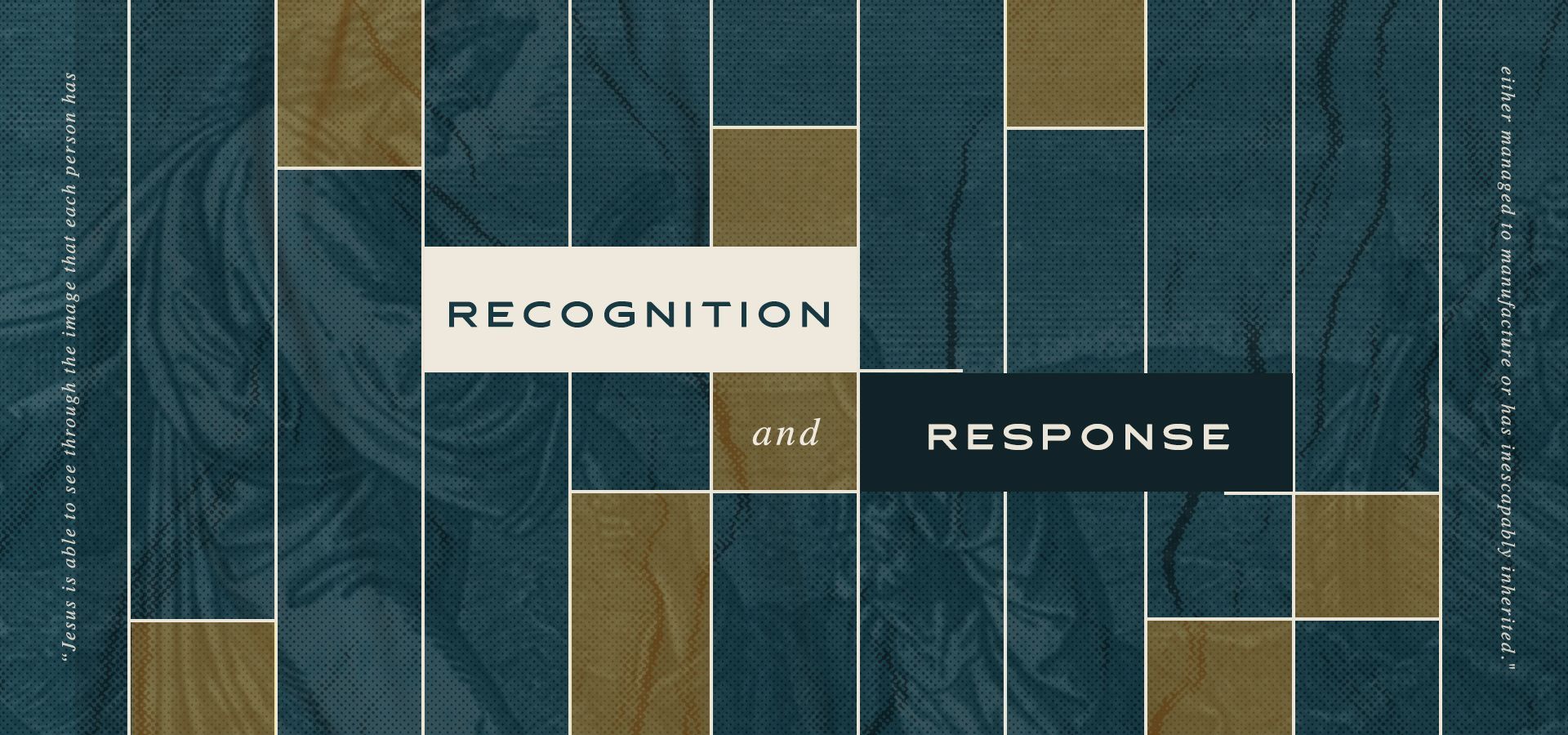
As we read the stories of Jesus, we soon marvel at the array of characters, personalities and backgrounds that He chooses to engage. We read of kings and commoners, priests and paupers, rulers and wrongdoers. We know of farmers and felons, schemers and scorners, masters and manipulators. Truly, “there is no favoritism with God” (Romans 2:11). And a continuing theme throughout the constant stream of interactions is that of recognition — a two-way recognition. One direction of this recognition is that Jesus is able to see through the image that each person has either managed to manufacture or has inescapably inherited. He cuts through the screens and sees where their projection is sourced. He sees them for who they truly are. And this light, His light, is met with differing reactions. Some squint and squirm while others repent and find rest. The second direction of the two-way recognition is related and often comes on the heels of the first. We see it when differing individuals recognize who Jesus is. Some of the more memorable reactions mark world-changing conversions. Peter exclaims, for example, “You are the Messiah, the Son of the living God!” (Matthew 16:16). The Samaritan woman at the well testified, “Come, see a man who told me everything I ever did! Could this be the Messiah?” (John 4:29). And after fearing for their lives within a storm-tossed ship, his disciples marveled, “Who then is this? Even the wind and the sea obey Him!” (Mark 4:41). But again, this recognition isn’t shared only by those who repent and find rest. We see some who squirm and squint at their recognition of who Jesus is. We find Pilate’s playful suspicion when asking the Jews, “What should I do then with Jesus, who is called Messiah?” (Matthew 27:22). We also hear the shrieks of demons who shout, “What do You have to do with us, Son of God? Have You come here to torment us before the time?” (Matthew 8:29). So then, what are we to do with this two-way recognition? We are to rightly recognize Christ for who He is — the Son of God incarnate. But we’re not to stop there, for even the demons can rightly recognize Him in this regard. In light of this truth, we’re invited to be truly known and truly loved — to repent of our sin and rest in Christ’s finished work. We are to submit to His Lordship. A final implication is to clearly present Christ to others. Their reaction, as we’ve seen, is beyond our control, but we are to faithfully usher them to a recognition of who He is. A continued effort toward clarity through Scripture and the enlightenment of the Spirit is our only hope for a right response to this two-way recognition. Our pursuit and prayer is a response much like those who observed and listened to the Samaritan woman at the well. “We no longer believe because of what you said, for we have heard for ourselves and know that this really is the Savior of the world.” (John 4:42). Here are a couple questions I’ve considered in response to this two-way recognition: Who have I recently overlooked or thought beyond the reach of the gospel? What uncomfortable area might God be calling me to step into in order to clearly present Jesus as Messiah?
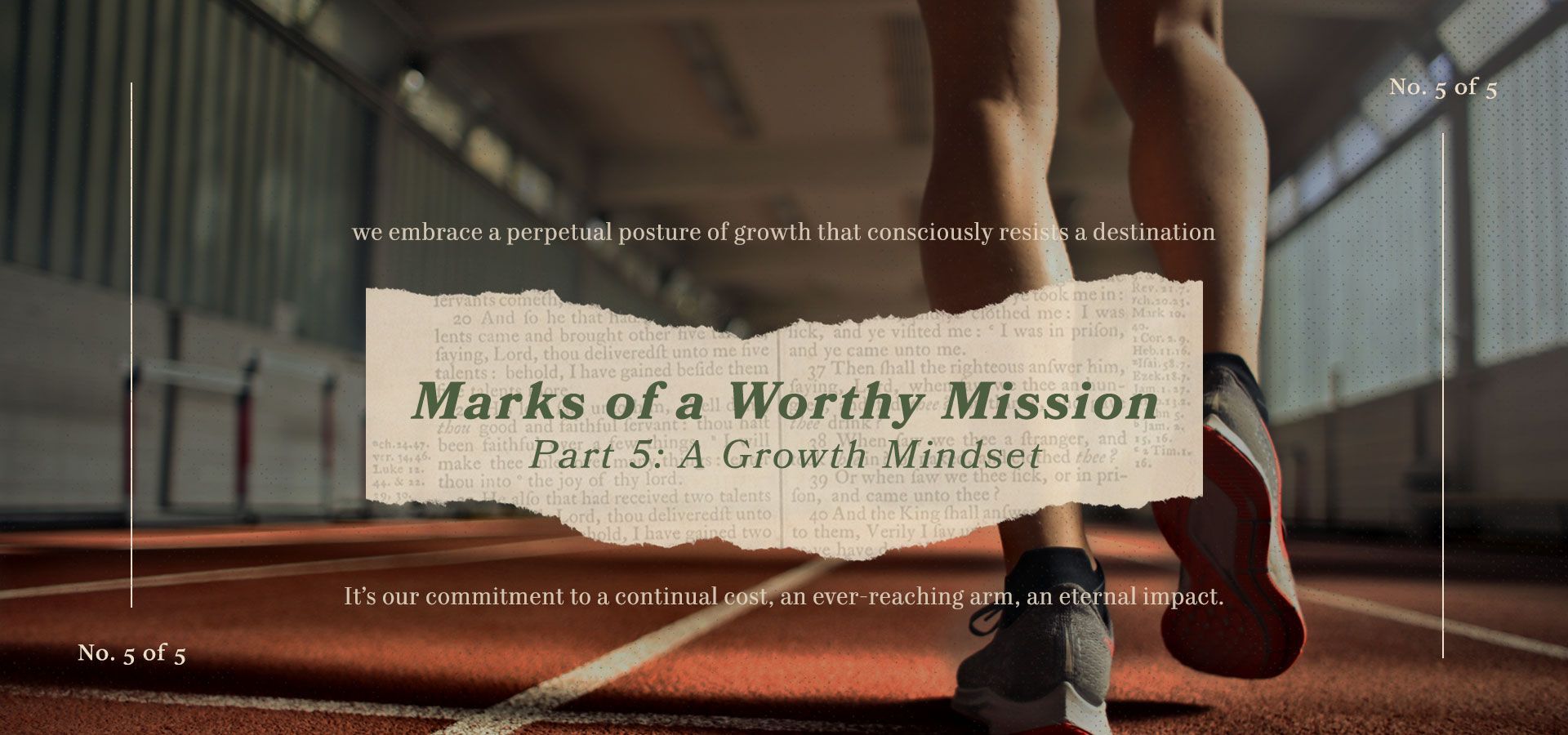
When we’re invited to adopt a growth mindset, we’re open and eager to subscribe. Whether it’s relational, intellectual, or financial, growth sounds great! There are actually very few areas of our life where we would consider it a bad thing. And yet, our commitment to growth is open calculated. Meaning, our intentions for growth and the effort required to obtain growth will open have an expressed aim, a desired endpoint. As long as an effort is required, we hold a metric in mind that would qualify as “enough”. There is a concept of comfort that we’re willing to work toward, but it’s with the intention of eventually ending the effort. For example, we’re willing to build a house so that we would have a house to live in. And we’re willing to invest in retirement so that we would one day be able to retire. However, the growth mindset that we endorse and embrace at FCA, pushes beyond any cradle of comfort. In this final post of my five-part series, I’m leaning into the perpetual posture of growth that consciously resists a destination. It’s our commitment to a continual cost, an ever-reaching arm, an eternal impact. Spiritually, this concept is known as perseverance and Paul speaks to its effects in Romans 5:3-4. We rejoice in our sufferings, knowing that suffering produces endurance, and endurance produces character, and character produces hope, and hope does not put us to shame, because God’s love has been poured into our hearts through the Holy Spirit who has been given to us. At FCA we’re convinced that anything less than a growth mindset would become a guaranteed, eventual end. Our continued existence and impact as an organization stands testament to this belief and commitment. We’ve refused to view a first down as a Super Bowl victory. We know that there will always be more effort to exert, more cost to consider, and more people to impact, and we also know that it will always be worth it. The metrics of our growth mindset embrace an ever-expanding scope that will continue to invite more investment and more involvement from more individuals. This growth mindset is the final mark of a worthy mission.
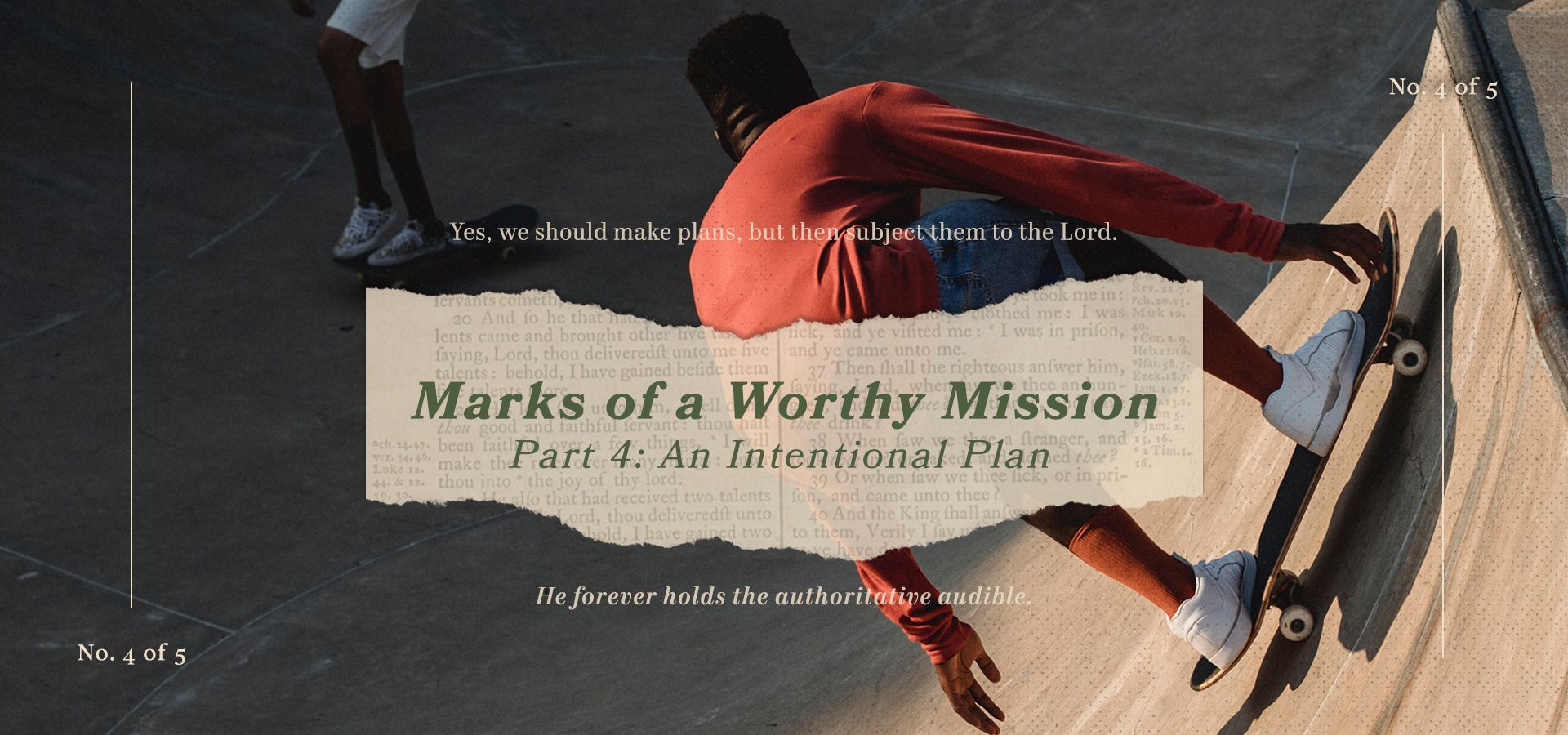
In part 3, I worked hard to convey our central mission of building relationships. That focus must be understood and maintained before moving on to our present point, an intentional plan. It’s important because we can often believe that relationships are strictly organic. They’re easily seen as essential, but are too often assumed or overlooked. We like to think that the most natural relationships are the most genuine; the ones that we feel don’t require work. Perhaps even more common, it’s believed that structure will either deprive a relationship of its sincerity or suffocate it with monotony. But in truth, healthy relationships require intentionality. As warned by the well-worn axiom, “Failing to plan is planning to fail”. So, how do we value both the stability of structure and the spark of spontaneity? In God’s revelation of Himself, through both creation and Scripture, we see incalculable structure that is also dynamic and spontaneous! Structure can be suffocating, but it doesn’t have to be. Spontaneity can be risky, but it doesn’t have to be. The deeper truth is that the two actually need each other. For example, the beauty of a basketball star is her ability to be creative, dynamic and spontaneous within the structure of the game. And while the freestyle skateboarder might take pride in his sport’s wide parameters, he still requires structured rails, ramps and judges. This guides us, then, into appreciating our dynamic and spontaneous relationships that require structured acknowledgement and investment. Our world is moving faster than it ever has before and I’m not only referring to its technological progress or global connectivity. Our days are fleeting. Months seem to dissipate like steam. Years are succinctly filed away. Because of this, we’re faced with the reality that if we desire to create experiences and spend time with others, we need to plan to do so. When it comes to investing valuable time with those that matter to us, spontaneity is often a luxury. Increasingly, it requires a focused effort. Finally, how are to we to handle our plans? Loosely. Proverbs 19:21 teaches us, Many plans are in a man’s heart, but the Lord’s decree will prevail (HCSB). Yes, we should make plans, but then subject them to the Lord. Yes, we should aim for connections, but seek the Lord’s alignment. He forever holds the authoritative audible. He’s the Great Choreographer. Our plans need to allow and sometimes expect His divine disruption. Still, we must plan. And we must plan with intentionality.
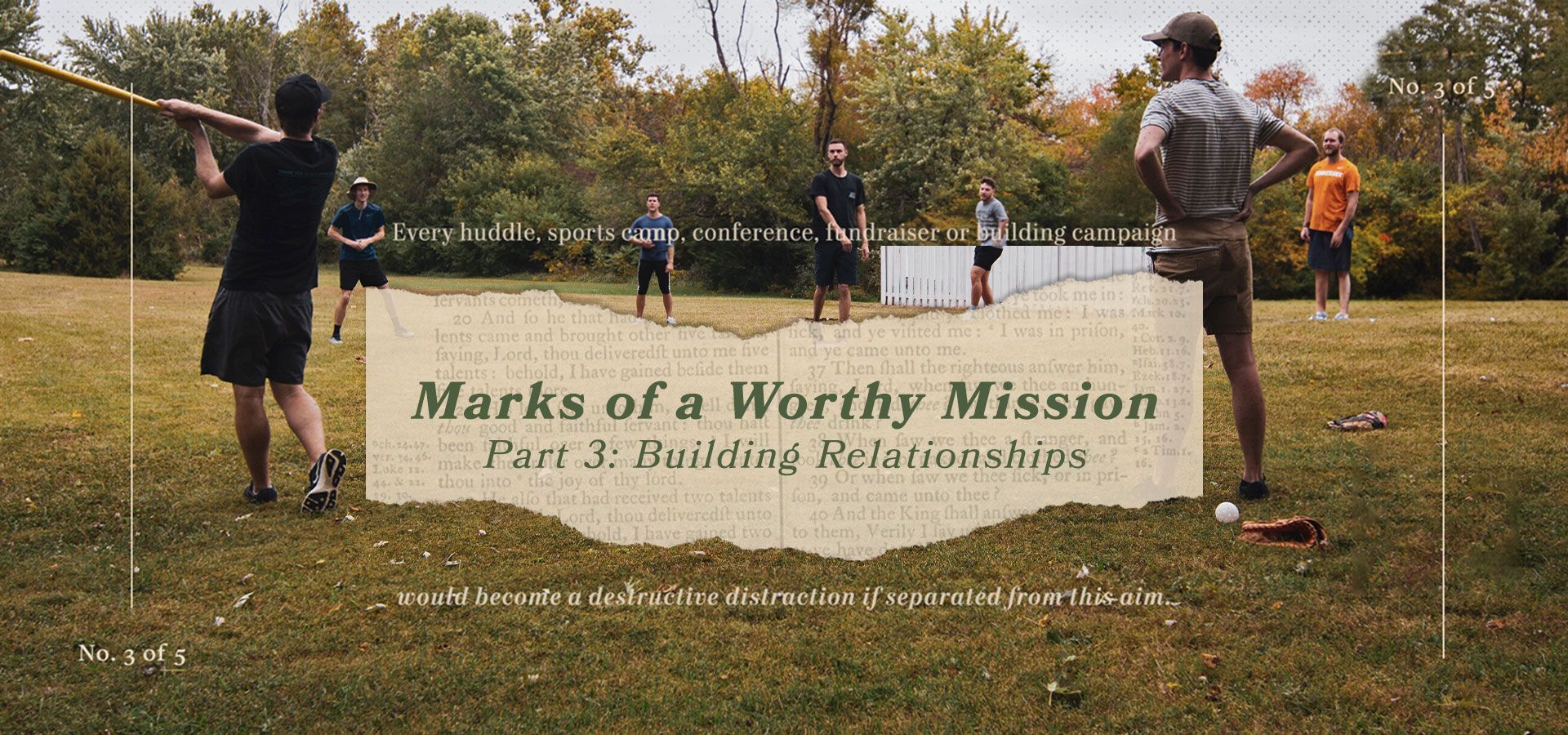
We’ve now come to the center of our 5-part series: Part 3, Building Relationships. But this isn’t simply half court or the 50 yard line, rather it is the very heart of our mission. Everything thus far leads to this point and everything to follow will draw from this point. This is our pulse. This is our purpose. Every huddle, every sports camp, every conference, fundraiser or building campaign would become a destructive distraction if separated from this aim. We exist to build meaningful and lasting relationships to the glory of God. Our hearts echo the apostle’s, “We cared so much for you that we were pleased to share with you not only the gospel of God but also our own lives, because you had become dear to us.” (1 Thessalonians 2:8 HCSB) I have a friend who notes the difference between a decision-centric ministry and a disciple-centric ministry. The first fosters the angst of a salesman who seeks to close a deal. Flush with clever marketing and emotional opportunity, an environment is created, a relationship is leveraged, and a decision is solicited. Assuming a positive outcome, that decision-maker is then trained to leverage more decisions. Conversely, a disciple-centric ministry invites others to grow in the grace and knowledge of Jesus. This same invitation is extended to believers and unbelievers alike. It is gentle, pa:ent and seeks conscious, costly commitment to a life under the Lordship of Jesus. Discipleship is not seen as a post-conversion training program, but the varied process of increasing intimacy with the One who calls us all to abide in Him (John 15). The disciple-centric ministry seeks to build relationships without a thought of leveraging them. If we are to truly be a disciple-centric ministry then we must be en:rely about relationships. We cannot be a people who simply share the gospel and then move on with life. We must be a people who yearn for deep relationships with others and rejoice in their deepening relationships with Jesus. This cannot be manufactured or manipulated. It is not conceived, but received. It is a journey that we’re invited into, not a trail we’re called to blaze. When building relationships, I’ve found three things that enable me to build deep and sincere relationships with others as Jesus did: By learning their love language. I apply the principles found in Gary Chapman’s The Five Love Languages by communicating my care and concern in the ways they recognize. I aim for fluency in their language of appreciation. By learning the power of presence. I open underestimate how distance can deteriorate a relationship. In our virtual and isolating world, I strive for in-person interactions whenever possible. By learning the significance of consistency. I cannot know everything about everyone and I’m not called to. But I do need to be consistent and available to respond when someone needs my help, support and prayers.
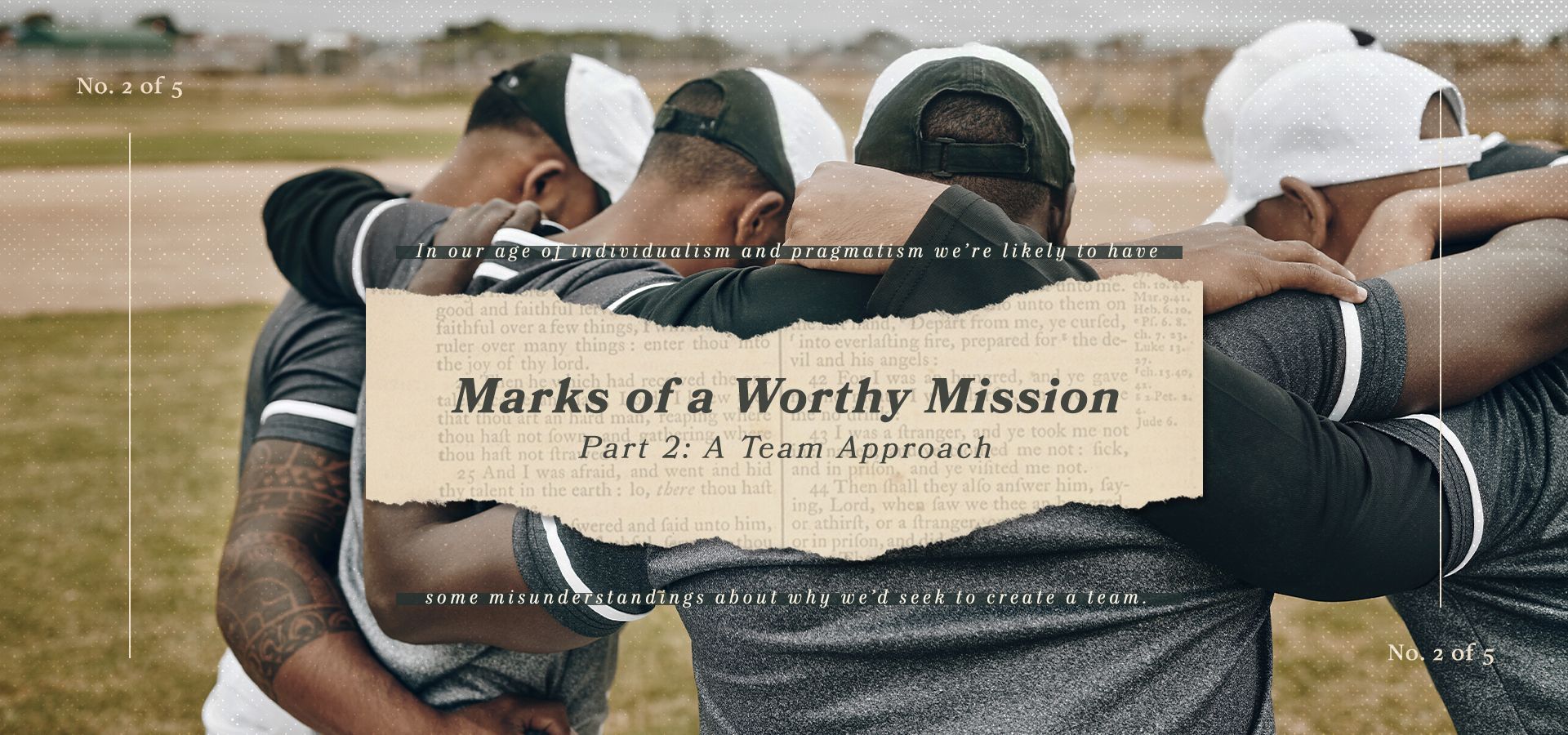
In our age of individualism and pragmatism we’re likely to have some misunderstandings about why we’d seek to create a team. We might assume it’s because a job is too big to do alone or perhaps because it requires an area of expertise in which we lack a particular skill. These can both be true, but both are also products of a culture obsessed with efficiency. Meaning, our society tends to invite others into a project only as a last resort. Our requests of others are reserved for the end of our rope; for when we see no other way. We reason that because others are already busy and further communication will only frustrate our timelines, that the project itself would be better served with as few personalities as possible. The adage is convincing: “If you want something done right, do it yourself.” At FCA, though, we believe that community is not simply for the sake of efficiency. Our eternally Triune God is a God of relationship and He has crafted us in His image for relationship. He has imprinted on us an inherent need for community. Because of this truth we’re convinced that even if the vision weren’t too big, and even if we did possess the particular skills needed, that we still ought to invite others into our Kingdom work. I’m pulling the “Jesus-card” on this one: even He enlisted a team! It certainly wasn’t a matter of efficiency. He could’ve accomplished His earthly mission as quickly as He brought galaxies into existence, but He chose to invite others into this Kingdom work. And He still does. So, rather than stating, “we need a team to accomplish our vision”, we’re convinced, simply, that “we need a team”. At FCA we aim to involve others through prayerful invitations and help them discover how their gifts can be used for eternal purposes. As conduits of Kingdom work we continue to witness a two-fold blessing: on those pouring, as well as those poured into. To withhold this invitation, then, would be a disservice to everyone involved. The team-approach is an essential part of our "Great Co-mission”. Here are a few questions I’ve used to cultivate and clarify my team approach: Am I reducing my team approach in the name of efficiency? Am I trying to prove myself to others? Do I tend to be impatient while working with others? How can I better listen to my community? Who am I involving in my work alongside me this week?

There is a sense of freedom and adventure that comes with mobility, but there is also an inescapable inhibition. In this way our lives could be compared to a potted plant. It’s free to travel, but its roots are bound and its growth is limited until it has been planted where it’s meant to be. Kate and I have been riding the exhilaration of relocation, but have recently found ourselves longing for the deep, rich soil of everyday life. God has blessed us relationally as we’ve begun to dig in, but logistically, He seems content to leave us potted longer than we’d expected. We’re still shopping an erratic and intricate housing market. We continue acclimating to schools, workplaces and grocery store layouts. We’ve yet to choose our mechanic or pizza shop. Still, there is an exciting possibility that every house might be our home. Every avenue might be our address. If I sound a bit disjointed to you, then I’m communicating well. Whether potted or planted, our Gardener has been good. He has been intimate and faithful. He has been both patient and prodding. With every touch He gently guides us in His will and, just as importantly, in His time. A friend of mine recently told me that a great decision at a terrible time will be a terrible decision. In our eagerness to escape the clay walls of our pot and stretch our reaching roots into soft, fresh soil, we’re wary of digging in where we don’t belong. These well-worn words of Jesus have aired a fresh breeze across our longing leaves: This is why I tell you: Don’t worry about your life, what you will eat or what you will drink; or about your body, what you will wear. […] Learn how the wildflowers of the field grow: they don’t don’t labor or spin thread. Yet I tell you that not even Solomon in all his splendor was adorned like one of these! […] Your heavenly Father knows that you need them. But seek first the kingdom of God and His righteousness, and all these things will be provided for you. — Matthew 6:25, 28-29, 32-33 HCSB His provision is promised! He sees our needs and invokes His own track record. Could we ask for more?! This passage is an appropriation of priority. It’s an invitation to see and seek through the lens of His kingdom. The pot that we’ve found ourselves in is part of His process and our eyes must be set on His. When we feel that our hopes are hanging, that our roots are restricted, that our fruit is frustrated, that our wishes are wilting, we’re reminded that He is the Lifter of our heads (Ps. 3:3). He’s preparing the ground and will plant us once more. Until then we’re invited to rest… as a potted plant in His gracious hands.

Dear Friends, It’s hard to describe our family’s recent adventures within a few sentences… but I’ll give it a shot. From leaving our home, our friends and family after 40 years in New York, to beginning a new role in FCA and moving across the country to Kansas; it feels as though we’ve lived a lifetime in a single year. The Lord has been relentlessly good to us through it all. We’ve discovered more of His mercies and grace inviting us to depths of faith we’ve never experienced before. And we can’t begin to express the many ways you’ve supported us by way of prayers and generosity. We thank you, truly, from the bottom of our hearts. Our lives and those to whom we minister have been forever changed because of your friendship, support and love. This is quite possibly the most exciting time in FCA’s history as we're on the doorstep of our first ever Capital Campaign! We plan to build facilities that would sustain the advance of our mission for generations to come. It’s a mission worth reiterating: We aim to lead every coach and athlete into a growing relationship with Jesus Christ and His Church. Our team of Regional leaders is growing! I’m privileged and humbled to coach them through biblically based, donor-centered-development. And by updating our Leadership Board resources we seek to support every staff member, ensuring no one will serve alone in their communities. As we launch into another year, the Lord has big plans for our Donor and Board Advancement team. Our goal is to provide Strategy, Training and Resources for fields around the globe. These foundational relationships – Donors and Board Members – are critical to the legacy of FCA and will ultimately impact eternity. This year we’ll be working to expand donor generosity in three critical areas: Launch our Every Generation campaign to raise $100 Million over the next three years for building FCA Sports facilities. Build a robust training and development plan for the Regional Directors of Donor and Board Advancement. (This includes podcasting, blogging, online training and cutting-edge professional development in the area of donor development.) Create a donor-centric-development model for our staff (building on the missionary support model) to include regional and organizational donor-growth strategies. Friends, I’m grateful to you and grateful for you! May your Christmas be blessed in the light of our Savior’s love, David Parks

It’s official. The Parks family is now mostly Kansan! I say mostly because there are quite a few possessions still trickling onto our doorstep in shipping containers. Unwrapping your own belongings can feel a bit like Facebook’s Memories feature by ushering smiles, stories, and occasional concern. What was I thinking?! Very soon, though, our family will be certified midwesterners with a mailing address and license plates to prove it. I know families relocate all the time, but this has been an entirely new experience for me. At times it’s felt a bit out-of-body; as if I’m watching a movie about a man and his family on a fearless, westward adventure, while behind the scenes I’m privy to the doubt and indecision that plague it. It’s certainly been difficult, but surprisingly more frustrating: it’s been uncomfortable. Before this life-change, I didn’t realize how deeply I’d desired and designed my comforts. I had a favorite coffee shop and a favorite coffee. I had a barber. I had a daily routine and I could drive places without needing GPS. I knew where to pay my taxes and I knew how much they would be (just kidding). In a way this sounds ridiculous, but it proves a more ridiculous point: I’d spent years crafting a comfortable life by padding it with preference and predictability. Though I don’t believe I’ve been called to a life without comforts, I do believe I’ve been drawing a portion of my peace from them. Callouses, like comforts, properly develop against abrasions, but when they’re torn away the skin is raw, exposed and sorely sensitive. This is where God has me. Being stripped of my calloused comforts I’m finding an increased sensitivity to what God is saying and doing. More than simply receptive, I’m expectant, eager even, to move beyond this stage of exposure. I’m looking for a new barber, frantic for a firm routine and desperate for a bold coffee brew. Comfort isn’t evil anymore than chaos is holy, but at the heart of the matter is this question: How deeply do I allow my luxuries to placate my listening? This time of transition has served as a gracious invitation to lean in. So don’t worry about these things, saying, ‘What will we eat? What will we drink? What will we wear?” These things dominate the thoughts of unbelievers, but your heavenly Father already knows all your needs. Seek the Kingdom of God above all else, and live righteously, and he will give you everything you need. Don’t worry about tomorrow, for tomorrow will bring its own worries. Today’s trouble is enough for today. Matthew 6:31-34 NLT A final thought: as I sort through my boxes of belongings, I’m granted an opportunity to reevaluate each item’s readmission to my life. I’m curating my comforts. And as my callouses begin forming once again I’m praying for wisdom in the process.

For there is no difference between Jew and Gentile—the same Lord is Lord of all and richly blesses all who call on him for, “Everyone who calls on the name of the Lord will be saved. Romans 10:12-13 While it may seem hard to believe, in today’s world, phones are still the number one communication device that we use. When they were first created, the ability to pick up the phone and talk to someone who lives anywhere changed the world in a dramatic way. In my line of work, I spend about 90 percent of my time on the phone, or constructing a plan for who I am going to call that day. I love it because it is a way to connect with people. My reasons for a call vary: I might want to invite someone to do something, or need something from someone, or maybe I need to communicate with someone a feeling I have for them, or even just to order take-out! While my reasons for a call may differ, all of them denote that there is a relationship I have with someone. When I reflect on my daily schedule, I ask myself, “How much of my time do I spend calling on God, the most important relationship I have above all others?” When I have questions and need answers about a relationship or a life situation, do I call on Him first, and Him alone? Calling on God is not about “checking off” the Ten Commandments, it’s a way of connecting with Him and seeking His will for our lives above all else. In Romans 10 Paul reminds “everyone,” … Jew and Gentiles alike, that when we call on God, He is rich to us and we will be saved. So, why wouldn’t we want to call on Him for everything? If we are not sensing His richness in our lives, and security in our eternal purpose, we are probably not calling on Him. When we as Believers call on Him for our strength and His richly blessings, then He will be glorified and we will be saved.

Instead, you must worship Christ as Lord of your life. And if someone asks about your hope as a believer, always be ready to explain it. 1 Peter 3:15 Recently, I had a rare opportunity to go to Wegmans by myself, without any of my three young children in tow. I was looking forward to getting through the list in a more efficient manner than normal. While in the checkout line, the cashier who was a young woman began to share about the disparaging remarks that had been directed to her by not just one, but two of the prior customers. She offered these remarks to me unsolicited which told me that she was really hurt by what had taken place. I offered the first thought that came to mind and so I said, “What people say to you is not a reflection of who you are.” She looked at me and asked, “Are you some kind of inspirational speaker?” I told her that I wasn’t, but that I really believed what I had just said to her. As she continued to load the cart, my mind quickly drifted back to my eagerness to be on my way. As I left the store and made my way through the parking lot, the verse from 1 Peter came to mind, “… you must worship Christ as Lord of your life. And if someone asks you about your Christian hope, always be ready to explain it.” (1 Peter 3:15). I knew that in my haste to finish my shopping, I had missed an opportunity. Some other responses began to run through my mind about what I could have, and should have said when she asked “who am I”. Sometimes, as Christians we can spend a lot of time “preaching” to people who may not be ready to hear it. But here, this young woman had noticed something different in me, and had specifically asked me about who I was, and I failed to let her know that who I am is a reflection of God at work in me. This incident was a reminder to me that if I am living it, and am asked about it, I must have an answer prepared that both pleases and glorifies Him. I am not holding on to the guilt I felt that day, because I know God has all things in hand. I share my experience to encourage us to be prepared to give Him the credit when someone notices something “different” about us.
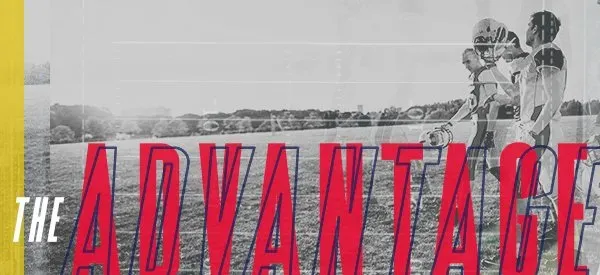
Nevertheless I tell you the truth. It is to your advantage that I go away; for if I do not go away, the Helper will not come to you; but if I depart, I will send Him to you. John 16:7 Having the advantage over your opponent in sports or in life is an interesting place to be. On one hand, it is exactly the position you desire. On the other hand, you know just how fragile the position is and that it can be lost at any moment even with the slightest misstep. I can remember as I was running the only marathon I have ever attempted to run in my life feeling as though I had the advantage. After completing the first twenty miles in three hours, I was feeling great and had my goal of completion under four hours in sight. With 6.2 miles remaining, I hit the proverbial “wall” and any advantage that I felt I had was suddenly gone. It took me one hour and twenty-two minutes to finish the race. I had clearly lost the advantage. As Jesus was preparing his followers for his departure, He described how in leaving them it would actually be to their advantage. Conversely to earthly or temporary advantages, this advantage would never leave his disciples. The Holy Spirit would allow Christ’s message of the coming Kingdom to go forward in ways that would not have been otherwise possible if Jesus hadn’t completed His mission. Easter brings so many emotions with it. From despair in the death of Christ on Good Friday to the waiting and mourning of Saturday to the elation of the resurrection on Sunday, we see the fullness of the gospel revealed. Today, the Kingdom of God is expanding to all nations and to every corner of the earth by the power of the Holy Spirit. It is easy for us to see now that it truly was to our advantage that Jesus would give His life for each of us. That said, you may be feeling as though you are disadvantaged at this present moment. Perhaps, you have been in a season where you have seen little or no progress in some areas of your life. I know that for me, the daily challenges of being a great husband, father of three and being a great Christ like example in the world today can leave me feeling as if I have lost my advantage. My prayer for us today is to be reminded and hold fast to the great promise Jesus made to all who follow him. His promised Holy Spirit is alive in us and is the only advantage we will ever need. By His Spirit, we know the truth and can live each day with purpose and hope. By His Spirit, we always have the advantage.
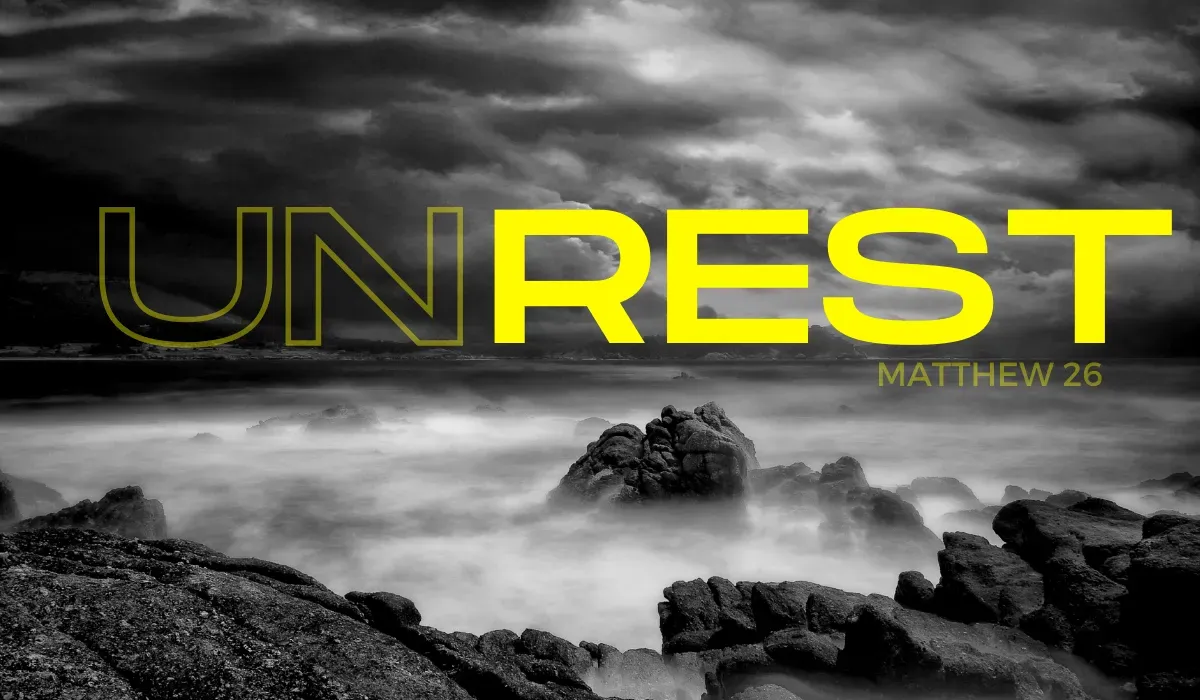
Matthew 26 Currently, some of our FCA teammates are reading one of Martin Luther King’s last books called Where Do We Go From Here: Chaos or Community? Here, Dr. King maps out the racial tensions that were occurring 54 years ago, and espouses that as a society we have a choice about how we view one another and respond to those who might not “look” like us on the outside. In his writing, Dr. King states “We still have a choice today: nonviolent coexistence or violent coannihilation. This may well be mankind’s last chance to choose between chaos or community.” In addition, we believe that Dr. King would agree that going beyond coexistence is essential. It involves not just nonviolence but compassion and empathy. Much of our societal unrest hasn’t changed much since Dr. Kings time. Racism continues to be one of our most divisive issues in our nation. But, my Christian brothers and sisters, we cannot allow the messaging of the world to seep in and create a negative mindset. Instead we must look at the opportunities that exist to love people. As Christians, our response to such a polarizing issue should be to live as Christ lived, and bring hope to a world that is broken and torn apart by the sin of racism. Jesus’s death and the promise it gives us for eternal life brings joy, and the peace of God which transcends all understanding (Philippians 4:7) that those around us will recognize. Unlike the world around us, if we remain confident in this truth our hearts will not remain in a state of unrest. The world wants to complicate things, but there is a very simple answer when it comes to loving your neighbor. That answer can only be found in the Gospel of Jesus Christ. Scripture points us to what it looks like to follow Dr. King’s approach of non-violence fueled by a greater purpose. In Matthew 26, while Jesus and his disciples are in the Garden of Gethsemane, when the Romans arrive to arrest Him, Peter, coming to Jesus’ defense, draws his sword. But, Jesus scolds him, and tells him to put away his sword. Even at that very moment when Jesus knew he was soon going to be unjustly tortured for no good reason, Jesus did not want violence, and was willing to lay down His own life out of empathy and love for a hurting world. As we look to Jesus’s example, our prayer is that he would use each of us and that we would biblically make the choice of nonviolent coexistence that Dr. King spoke about. In doing so we can recognize and support those who are hurting in a way that ultimately points them back to the One who provides hope.
Recent Posts

As we read the stories of Jesus, we soon marvel at the array of characters, personalities and backgrounds that He chooses to engage. We read of kings and commoners, priests and paupers, rulers and wrongdoers. We know of farmers and felons, schemers and scorners, masters and manipulators. Truly, “there is no favoritism with God” (Romans 2:11). And a continuing theme throughout the constant stream of interactions is that of recognition — a two-way recognition. One direction of this recognition is that Jesus is able to see through the image that each person has either managed to manufacture or has inescapably inherited. He cuts through the screens and sees where their projection is sourced. He sees them for who they truly are. And this light, His light, is met with differing reactions. Some squint and squirm while others repent and find rest. The second direction of the two-way recognition is related and often comes on the heels of the first. We see it when differing individuals recognize who Jesus is. Some of the more memorable reactions mark world-changing conversions. Peter exclaims, for example, “You are the Messiah, the Son of the living God!” (Matthew 16:16). The Samaritan woman at the well testified, “Come, see a man who told me everything I ever did! Could this be the Messiah?” (John 4:29). And after fearing for their lives within a storm-tossed ship, his disciples marveled, “Who then is this? Even the wind and the sea obey Him!” (Mark 4:41). But again, this recognition isn’t shared only by those who repent and find rest. We see some who squirm and squint at their recognition of who Jesus is. We find Pilate’s playful suspicion when asking the Jews, “What should I do then with Jesus, who is called Messiah?” (Matthew 27:22). We also hear the shrieks of demons who shout, “What do You have to do with us, Son of God? Have You come here to torment us before the time?” (Matthew 8:29). So then, what are we to do with this two-way recognition? We are to rightly recognize Christ for who He is — the Son of God incarnate. But we’re not to stop there, for even the demons can rightly recognize Him in this regard. In light of this truth, we’re invited to be truly known and truly loved — to repent of our sin and rest in Christ’s finished work. We are to submit to His Lordship. A final implication is to clearly present Christ to others. Their reaction, as we’ve seen, is beyond our control, but we are to faithfully usher them to a recognition of who He is. A continued effort toward clarity through Scripture and the enlightenment of the Spirit is our only hope for a right response to this two-way recognition. Our pursuit and prayer is a response much like those who observed and listened to the Samaritan woman at the well. “We no longer believe because of what you said, for we have heard for ourselves and know that this really is the Savior of the world.” (John 4:42). Here are a couple questions I’ve considered in response to this two-way recognition: Who have I recently overlooked or thought beyond the reach of the gospel? What uncomfortable area might God be calling me to step into in order to clearly present Jesus as Messiah?

When we’re invited to adopt a growth mindset, we’re open and eager to subscribe. Whether it’s relational, intellectual, or financial, growth sounds great! There are actually very few areas of our life where we would consider it a bad thing. And yet, our commitment to growth is open calculated. Meaning, our intentions for growth and the effort required to obtain growth will open have an expressed aim, a desired endpoint. As long as an effort is required, we hold a metric in mind that would qualify as “enough”. There is a concept of comfort that we’re willing to work toward, but it’s with the intention of eventually ending the effort. For example, we’re willing to build a house so that we would have a house to live in. And we’re willing to invest in retirement so that we would one day be able to retire. However, the growth mindset that we endorse and embrace at FCA, pushes beyond any cradle of comfort. In this final post of my five-part series, I’m leaning into the perpetual posture of growth that consciously resists a destination. It’s our commitment to a continual cost, an ever-reaching arm, an eternal impact. Spiritually, this concept is known as perseverance and Paul speaks to its effects in Romans 5:3-4. We rejoice in our sufferings, knowing that suffering produces endurance, and endurance produces character, and character produces hope, and hope does not put us to shame, because God’s love has been poured into our hearts through the Holy Spirit who has been given to us. At FCA we’re convinced that anything less than a growth mindset would become a guaranteed, eventual end. Our continued existence and impact as an organization stands testament to this belief and commitment. We’ve refused to view a first down as a Super Bowl victory. We know that there will always be more effort to exert, more cost to consider, and more people to impact, and we also know that it will always be worth it. The metrics of our growth mindset embrace an ever-expanding scope that will continue to invite more investment and more involvement from more individuals. This growth mindset is the final mark of a worthy mission.

In part 3, I worked hard to convey our central mission of building relationships. That focus must be understood and maintained before moving on to our present point, an intentional plan. It’s important because we can often believe that relationships are strictly organic. They’re easily seen as essential, but are too often assumed or overlooked. We like to think that the most natural relationships are the most genuine; the ones that we feel don’t require work. Perhaps even more common, it’s believed that structure will either deprive a relationship of its sincerity or suffocate it with monotony. But in truth, healthy relationships require intentionality. As warned by the well-worn axiom, “Failing to plan is planning to fail”. So, how do we value both the stability of structure and the spark of spontaneity? In God’s revelation of Himself, through both creation and Scripture, we see incalculable structure that is also dynamic and spontaneous! Structure can be suffocating, but it doesn’t have to be. Spontaneity can be risky, but it doesn’t have to be. The deeper truth is that the two actually need each other. For example, the beauty of a basketball star is her ability to be creative, dynamic and spontaneous within the structure of the game. And while the freestyle skateboarder might take pride in his sport’s wide parameters, he still requires structured rails, ramps and judges. This guides us, then, into appreciating our dynamic and spontaneous relationships that require structured acknowledgement and investment. Our world is moving faster than it ever has before and I’m not only referring to its technological progress or global connectivity. Our days are fleeting. Months seem to dissipate like steam. Years are succinctly filed away. Because of this, we’re faced with the reality that if we desire to create experiences and spend time with others, we need to plan to do so. When it comes to investing valuable time with those that matter to us, spontaneity is often a luxury. Increasingly, it requires a focused effort. Finally, how are to we to handle our plans? Loosely. Proverbs 19:21 teaches us, Many plans are in a man’s heart, but the Lord’s decree will prevail (HCSB). Yes, we should make plans, but then subject them to the Lord. Yes, we should aim for connections, but seek the Lord’s alignment. He forever holds the authoritative audible. He’s the Great Choreographer. Our plans need to allow and sometimes expect His divine disruption. Still, we must plan. And we must plan with intentionality.

We’ve now come to the center of our 5-part series: Part 3, Building Relationships. But this isn’t simply half court or the 50 yard line, rather it is the very heart of our mission. Everything thus far leads to this point and everything to follow will draw from this point. This is our pulse. This is our purpose. Every huddle, every sports camp, every conference, fundraiser or building campaign would become a destructive distraction if separated from this aim. We exist to build meaningful and lasting relationships to the glory of God. Our hearts echo the apostle’s, “We cared so much for you that we were pleased to share with you not only the gospel of God but also our own lives, because you had become dear to us.” (1 Thessalonians 2:8 HCSB) I have a friend who notes the difference between a decision-centric ministry and a disciple-centric ministry. The first fosters the angst of a salesman who seeks to close a deal. Flush with clever marketing and emotional opportunity, an environment is created, a relationship is leveraged, and a decision is solicited. Assuming a positive outcome, that decision-maker is then trained to leverage more decisions. Conversely, a disciple-centric ministry invites others to grow in the grace and knowledge of Jesus. This same invitation is extended to believers and unbelievers alike. It is gentle, pa:ent and seeks conscious, costly commitment to a life under the Lordship of Jesus. Discipleship is not seen as a post-conversion training program, but the varied process of increasing intimacy with the One who calls us all to abide in Him (John 15). The disciple-centric ministry seeks to build relationships without a thought of leveraging them. If we are to truly be a disciple-centric ministry then we must be en:rely about relationships. We cannot be a people who simply share the gospel and then move on with life. We must be a people who yearn for deep relationships with others and rejoice in their deepening relationships with Jesus. This cannot be manufactured or manipulated. It is not conceived, but received. It is a journey that we’re invited into, not a trail we’re called to blaze. When building relationships, I’ve found three things that enable me to build deep and sincere relationships with others as Jesus did: By learning their love language. I apply the principles found in Gary Chapman’s The Five Love Languages by communicating my care and concern in the ways they recognize. I aim for fluency in their language of appreciation. By learning the power of presence. I open underestimate how distance can deteriorate a relationship. In our virtual and isolating world, I strive for in-person interactions whenever possible. By learning the significance of consistency. I cannot know everything about everyone and I’m not called to. But I do need to be consistent and available to respond when someone needs my help, support and prayers.

In our age of individualism and pragmatism we’re likely to have some misunderstandings about why we’d seek to create a team. We might assume it’s because a job is too big to do alone or perhaps because it requires an area of expertise in which we lack a particular skill. These can both be true, but both are also products of a culture obsessed with efficiency. Meaning, our society tends to invite others into a project only as a last resort. Our requests of others are reserved for the end of our rope; for when we see no other way. We reason that because others are already busy and further communication will only frustrate our timelines, that the project itself would be better served with as few personalities as possible. The adage is convincing: “If you want something done right, do it yourself.” At FCA, though, we believe that community is not simply for the sake of efficiency. Our eternally Triune God is a God of relationship and He has crafted us in His image for relationship. He has imprinted on us an inherent need for community. Because of this truth we’re convinced that even if the vision weren’t too big, and even if we did possess the particular skills needed, that we still ought to invite others into our Kingdom work. I’m pulling the “Jesus-card” on this one: even He enlisted a team! It certainly wasn’t a matter of efficiency. He could’ve accomplished His earthly mission as quickly as He brought galaxies into existence, but He chose to invite others into this Kingdom work. And He still does. So, rather than stating, “we need a team to accomplish our vision”, we’re convinced, simply, that “we need a team”. At FCA we aim to involve others through prayerful invitations and help them discover how their gifts can be used for eternal purposes. As conduits of Kingdom work we continue to witness a two-fold blessing: on those pouring, as well as those poured into. To withhold this invitation, then, would be a disservice to everyone involved. The team-approach is an essential part of our "Great Co-mission”. Here are a few questions I’ve used to cultivate and clarify my team approach: Am I reducing my team approach in the name of efficiency? Am I trying to prove myself to others? Do I tend to be impatient while working with others? How can I better listen to my community? Who am I involving in my work alongside me this week?


